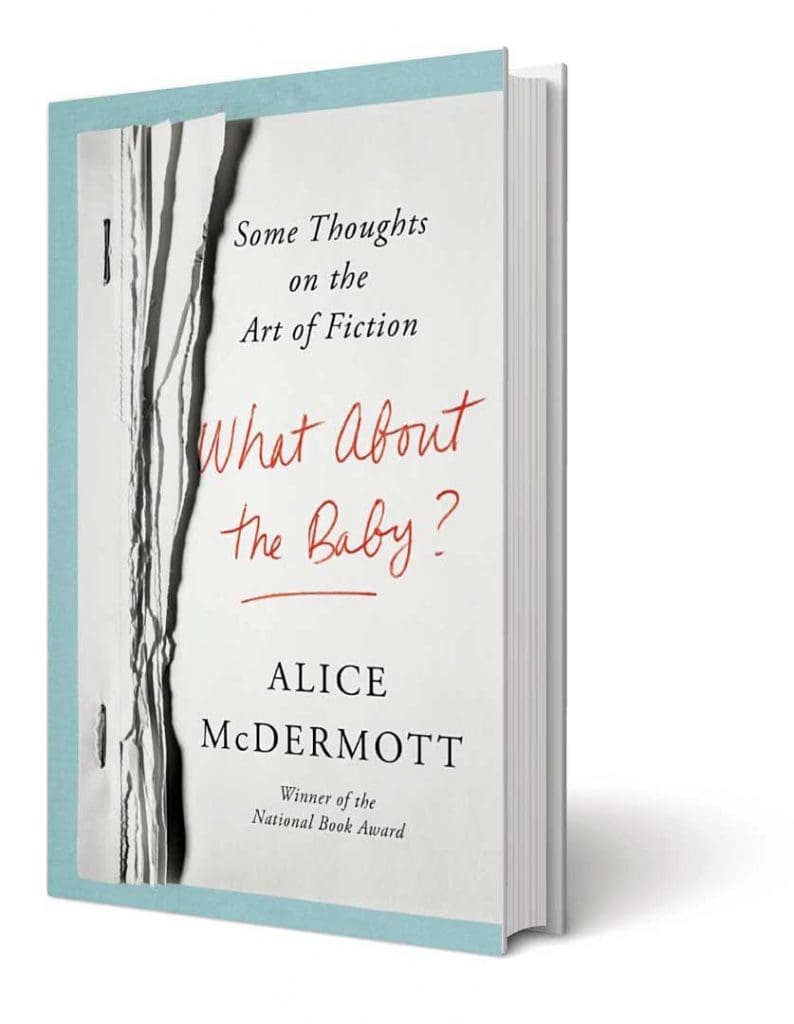A great work of fiction is timeless. It can reflect our own heartache or joy, inspire us, and delight us. According to Alice McDermott, Academy Professor and Richard A. Macksey Professor of the Humanities, humans have a deep, impractical need to read fiction.

We seek truth and consolation in the written word. We are all here so briefly and plagued with so many limitations that we seek fiction in order to live multiple lives.”
—Alice McDermott, Academy professor
Her most recent book, What About the Baby? Some Thoughts on the Art of Fiction, encapsulates that fervor, and dishes up valuable wisdom about the art of writing. Wisdom she’s gained over a lifetime.
This is McDermott’s ninth book, and her first that isn’t strictly literary fiction. It’s a collection of essays that blends her love of the genre with advice for writing captivating stories. McDermott retired from teaching in 2019 after 20 years at Johns Hopkins and the Sewanee Writers’ Conference. What About the Baby? is the culmination of that experience. Many of the essays were originally craft talks from in-person workshops, rewritten for the page early in the COVID-19 pandemic. Together, they give the reader both a practical manual and the intimate sense of peeking directly into the passion and process that goes into her writing.
“I expect the fiction I read to be written with no other incentive than it must be written,” she notes in the first essay.
What to expect of fiction
The opening essay is the oldest in the book, but still feels keenly relevant in 2022. McDermott sets out, alongside Mark Helprin’s short story “White Gardens” and other excerpts, what she expects from any work of fiction. She has high expectations: ruthlessly authentic characters, scenes that replicate our world’s beauty, and a clarity that can make sense of death.
Other essays in her book focus on the skills, effort, and dedication writing requires. Aspiring writers can take away tips on creating an unforgettable first sentence, or the importance of re-reading your own work. Anyone can enjoy her humorous musings on the legacy of writers such as Mary McCarthy or Eugene O’Neill, or what she would tell herself as a young writer. McDermott was torn on whether to include so many excerpts from other books and plays as she rewrote her essays. In the end, she decided that the reading experience would be incomplete without them.
“Anyone who picks up this book loves fiction, is writing it, or loves to read it,” she says. “Why should I say to the reader: ‘This is so beautiful. But I don’t want to trouble you with reading it’?”
Some of the most powerful essays focus on how interacting with others, both personally and professionally, helps craft a writer’s work. She says that communal tinkering with style and craft gives writers (and their coaches or teachers) both a community of commiseration, and the refinement that pulls a wonderful story out of a humdrum manuscript. Outside of the classroom, the fights, frustration, and interpersonal struggle of being human create the base so many good stories grow out of. All drama, she repeats, really is family drama. She’s looking forward to how the drama of the pandemic inspires new fiction from other writers. Her own COVID-inspired short story, “Post,” will appear in The Best American Short Stories 2022.
Take care of your characters

But what about that baby? The titular essay describes a baby from Lillian Hellman’s memoir Pentimento, but McDermott’s point is that the real “baby” is a writer’s characters. This advice is at the heart of the book. To be a good writer, one must put their own feelings aside, even if it requires relentless honesty. A writer needs to put themselves at the service of their characters, and no one else. Either find the essential truth in the world you are creating, or risk being predictable and disjointed, she says. “[This book is] very much about the give and take that happens alone in the writer’s mind,” she says. “How we in this field can support and maybe make each one of us a little bit of a better writer by being the reader that’s also the writer.”
McDermott is using her “retirement” to fulfill what she sees as the major obligation of her career: she has so much fiction she still needs to write. As of spring 2022, she’s finishing two more novels. She is also giving a reading at University of Rochester, and teaching a writing workshop in Connemara, Ireland. Echoing the final essay of What About the Baby?, there’s no other option for her. Writing fiction is just a way of being.




